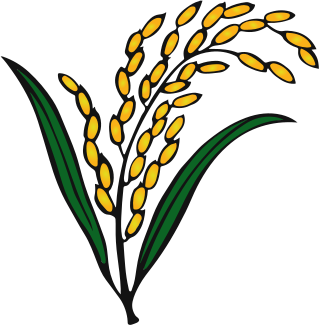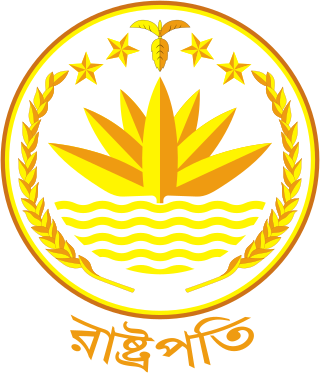
Politics of Bangladesh takes place in a framework of a parliamentary representative democratic republic, whereby the Prime Minister of Bangladesh is the head of government and of a multi-party system. Executive power is exercised by the government. Legislative power is vested in both the government and parliament. The Constitution of Bangladesh was written in 1972 and has undergone seventeen amendments.

Iajuddin Ahmed was the President of Bangladesh, serving from 6 September 2002 until 12 February 2009.

The Bangladesh Nationalist Party is a major political party in Bangladesh. Founded on 1 September 1978 by Bangladeshi president Ziaur Rahman with a view of uniting people with a nationalist ideology, BNP later became one of the two dominant parties in Bangladesh, along with its archrival Awami League. Initially a big tent centrist party, it later moved towards more right-wing politics.

Bangladesh Awami League, simply known as Awami League, is one of the major political parties in Bangladesh. The oldest existing political party in the country, the party played the leading role in achieving the independence of Bangladesh. It is also one of the two most dominant parties in the country, along with its archrival Bangladesh Nationalist Party.

The president of Bangladesh (POB), officially the president of the People's Republic of Bangladesh, is the head of state of Bangladesh and commander-in-chief of the Bangladesh Armed Forces.

The prime minister of Bangladesh, officially prime minister of the People's Republic of Bangladesh, is the chief executive of the government of Bangladesh. The prime minister and the cabinet are collectively accountable for their policies and actions to the Parliament, to their political party and ultimately to the electorate. The prime minister is ceremonially appointed by the president of Bangladesh.

The Jatiya Sangsad, often simply referred to as Sangsad and also known as the House of the Nation, is the supreme legislative body of Bangladesh. The current parliament of Bangladesh contains 350 seats, including 50 seats reserved exclusively for women. Elected occupants are called members of Parliament, or MPs. The 12th national parliamentary election was held on 7 January 2024. Elections to the body are held every five years, unless a parliament is dissolved earlier by the President of Bangladesh. On 6 August 2024, President Mohammed Shahabuddin dissolved parliament after the resignation of Sheikh Hasina and ordered to form an interim government.

Hussain Muhammad Ershad was a Bangladeshi military officer and politician who served as the president of Bangladesh from 1982 to 1990.

Bangladesh elects on national level a legislature with one house or chamber. The unicameral Jatiyo Sangshad, meaning national parliament, has 350 members of which 300 members are directly elected through a national election for a five-year term in single-seat constituencies while 50 memberships are reserved for the women who are selected by the ruling party or coalition. The Prime Minister is the head of the government. The president who is the head of the state is elected by the National Parliament. The president of Bangladesh is a ceremonial post and does not exercise any control over the running of the state.
The Bangladesh Krishak Sramik Awami League was a political front comprising the Bangladesh Awami League, the Communist Party of Bangladesh, the National Awami Party (Muzaffar) and Bangladesh Jatiya League.

General elections were held in Bangladesh on 12 June 1996. The result was a victory for the Bangladesh Awami League, which won 146 of the 300 directly elected seats, beginning Sheikh Hasina's first-term as Prime Minister. Voter turnout was 75%, the highest to date. This election was the second to be held in 1996, following controversial elections held in February a few months earlier.

General elections were held in newly independent Bangladesh on 7 March 1973. A total of 1,078 candidates and 14 political parties contested the elections.

General elections were held in Bangladesh on 7 May 1986. A total of 1,527 candidates contested the elections. The result was a victory for the Jatiya Party, which won 153 of the 300 directly elected seats. Voter turnout was 61%. Bangladesh Nationalist Party, the winner of the previous elections, boycotted the election.

The history of Bangladesh (1971–present) refers to the period after the independence of Bangladesh from Pakistan.

Mohammed Zillur Rahman was a Bangladeshi politician who served as the President from 2009 until his death in 2013. He was also a senior presidium member of the Awami League. He is the third president of Bangladesh, after Sheikh Mujibur Rahman and Ziaur Rahman, to die in office, while being the first to die of natural causes.

Mohammad Abdul Hamid is a Bangladeshi politician who served as the 15th president of Bangladesh from 2013 to 2023. He was elected to his first term in April 2013, and re-elected in 2018. Previously, he served as the speaker of the Jatiya Sangsad from January 2009 to April 2013. He was the acting president after the death of Zillur Rahman in March 2013. He was the longest serving president in the history of Bangladesh.

A constitutional referendum was held in Bangladesh on 15 September 1991. Voters were asked "Should or not the President assent to the Constitution Bill, 1991 of the People's Republic of Bangladesh?" The amendments would lead to the reintroduction of parliamentary government, with the President becoming the constitutional head of state, but the Prime Minister the executive head. It also abolished the position of vice-president and would see the President elected by Parliament.

Indirect presidential elections were held in Bangladesh on 22 April 2013 following the death of Zillur Rahman on 20 March 2013.

Since the independence of Bangladesh, the presidential election process has been changed several times due to both the presidential and parliamentary arrangements. According to the Second Schedule to the Constitution of 1972, the president of the parliament used to be elected by a secret vote. Later, according to the fourth amendment to the constitution, the provision of the direct election system of presidential election was introduced. But soon after 12th Amendment to the Constitution, the provision of presidential elections through an indirect election was introduced after the parliamentary system was installed. At present, the president is elected by an indirect election by the members of parliament as per Article 48 of the Constitution.

















